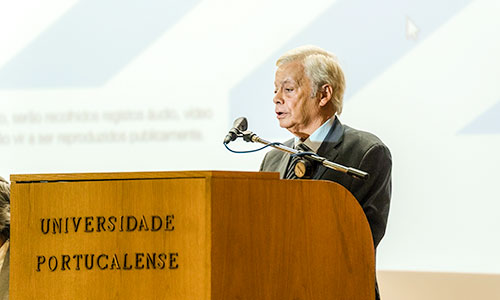On 10 September, at the Institutional Welcome Session, the Chairperson of the Board of Directors, Armando Jorge de Carvalho, highlighted the sustained growth of the University, which once again recorded an increase in the number of students, despite the 12% reduction in the total number of applicants to Higher Education at national level.
For Armando Jorge de Carvalho, this result reflects “the market’s recognition of the work carried out by the academic community, which contributes to strengthening the institution’s prestige.” He also recalled recent achievements, such as the award of the “green lane” regime by A3ES in the process of accrediting study cycles and the “Very Good” evaluation achieved by the University’s four Research Units in the FCT evaluation.
Addressing the new students, he emphasised that the road ahead is demanding but also full of opportunities: “It will certainly require a great deal of effort on your part, great resilience, dedication, hard work, and discipline. It’s not always easy to overcome difficulties but every obstacle you overcome will make you stronger, more confident, and better prepared. Such effort will pay off with new knowledge, experiences, and friendships.”
He asserted the institution’s commitment to train responsible citizens and competent professionals: “We want you to be active agents in the improvement global society by exercising full and responsible citizenship, becoming committed citizens and exemplary professionals.”
He ended with a message of accountability: “The world is currently experiencing times of extreme complexity and instability, with conflicts and crises affecting all sectors of society. These challenges are also reflected in the daily lives of families, on a social, economic, and emotional level. It is in this context that we challenge you to build a solid future, based on knowledge, values, and civic intervention.”
In his speech, Rector Fernando Ramos emphasised the institution’s path of affirmation since its foundation in 1986 and the consolidation of its training offer in various areas of knowledge. He recalled the more traditional courses, such as Law, Management, Economics, and Tourism, but also the more recent and expanding areas, such as Architecture, Multimedia, International Relations, and Engineering. He also mentioned the creation of Portucalense Business School in 2023 as an example of the reinforcement of the commitment to advanced and executive training.
Fernando Ramos pointed to two of the university’s strategic pillars: the promotion of scientific research and pedagogical innovation, which involves the adoption of active learning methodologies and the incorporation of the latest digital technologies, including generative artificial intelligence. “Our aim is clear: to ensure that our students’ education is on a par with the best in Portugal and the world, preparing them for an increasingly complex future that requires solid foundations, both scientifically and in terms of human and behavioural aspects,” he concluded.
The Institutional Welcome Session also included the presentation of the Quality and Merit Promotion Scholarships, as well as the “Brandzone – Media Experts” and “Giacomini Portugal” awards. The programme ended with performances by Tuna Feminina and Tuna Académica, which reinforced the atmosphere of integration and celebration.

